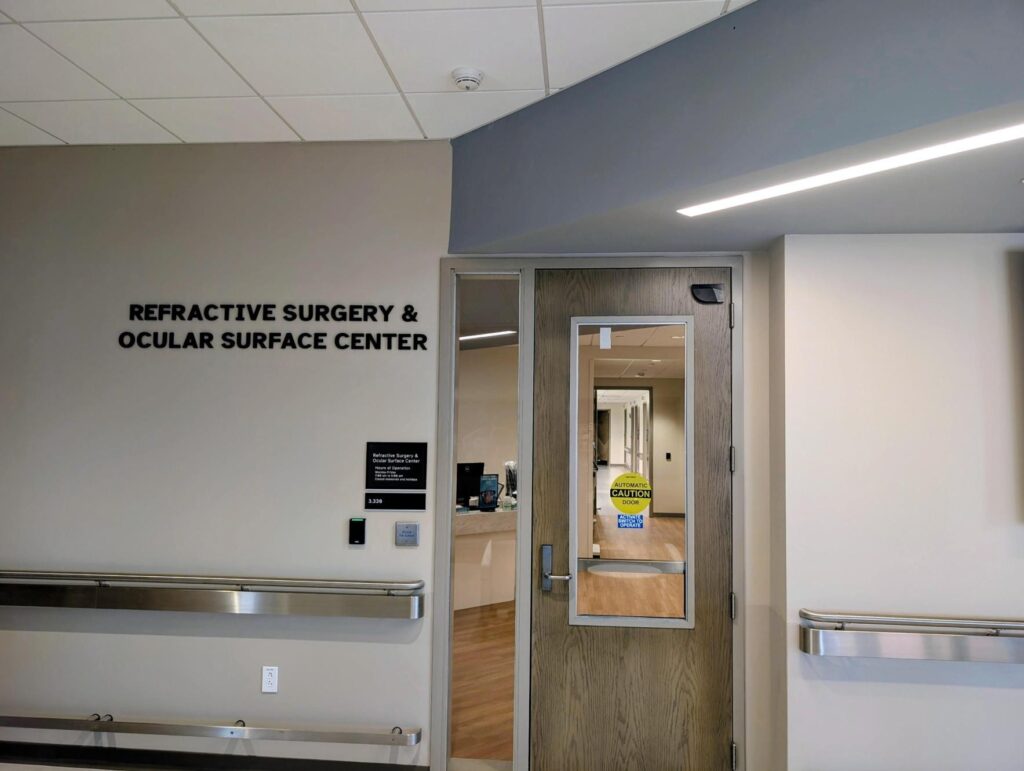The Dry Eye Clinic at the UPMC Vision Institute – which opened in November 2023 – is led by Sabrina Mukhtar, MD, MPH, Assistant Professor of Ophthalmology.
When Dr. Mukhtar did her residency and fellowship at the University of Pittsburgh School of Medicine, she noticed that providers were treating dry eye disease very differently, which was challenging for patients. “There wasn’t a place where we could streamline our dry eye care,” Dr. Mukhtar said.
Since its opening, the Dry Eye Clinic has been a huge success. Patients have voiced satisfaction in being able to receive comprehensive dry eye care and have access to all technologies in one place. Both Dr. Mukhtar and Dr. Marissa Heary, OD, see patients in the clinic offering both ophthalmologic and optometric expertise for each patient. They work synergistically to provide access and holistic care to their patients.
Unique services offered at the Dry Eye Clinic include further diagnostic technologies. Each visit starts prior to coming in with an extensive questionnaire to better understand the impact of dry eye on each patient’s life. Risk factors are identified through a machine-based learning technology called CSI Dry Eye, which has been revolutionary in diagnosing and treating dry eye disease. During clinic visits, further diagnostic technologies are used to tease out etiologies of dry eye disease and advanced therapies including intense pulsed light therapy (IPL), low light level therapy (LLLT), BlephExR, and scleral lens technology. The clinic offers a deeper knowledge of new medications on the market to address ocular surface disease. The clinic is also actively participating in endeavors and studies to further advance care in the field.
Due to the high demand for the Dry Eye Clinic expertise, patients should be started on conservative therapies prior to referral, including artificial tears, warm compresses, and an anti-inflammatory. “The reason we have the Dry Eye Clinic is for those patients who have exhausted a lot of our conservative therapies and need advanced care to help with treatment,” Dr. Mukhtar said.
Dr. Mukhtar said one special thing about the clinic is the staff; from the moment a patient is referred, every staff member works toward providing care for these patients. Time and time again, patients express gratitude for the incredible and highly trained staff in the clinic. The clinic has also cultivated equity partnerships with the Eye & Ear Foundation and other organizations to help provide care to everybody despite their sociodemographic background.
As a chronic disease, dry eye requires chronic upkeep. If a provider feels a Vision Institute patient needs more care, they are referred to the Dry Eye Clinic. Dr. Mukhtar’s goal is for patients to return to their referring providers once they “graduate” from the Dry Eye Clinic. They will have their regimen set and just need a yearly exam, so that they are able to incorporate their comprehensive and dry eye care in one visit, reducing the burden on patients for multiple visits.
The Dry Eye Clinic is located on the third floor of the Vision Institute, in the Refractive and Ocular Surface Suite. Clinic is typically on Fridays from 8 am to 5 pm, but procedures are performed on certain Wednesday afternoons of the month as well, specific to dry eye treatment.
